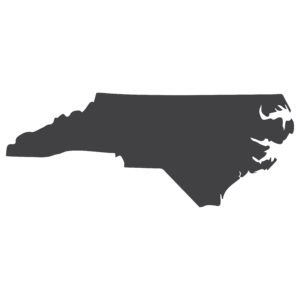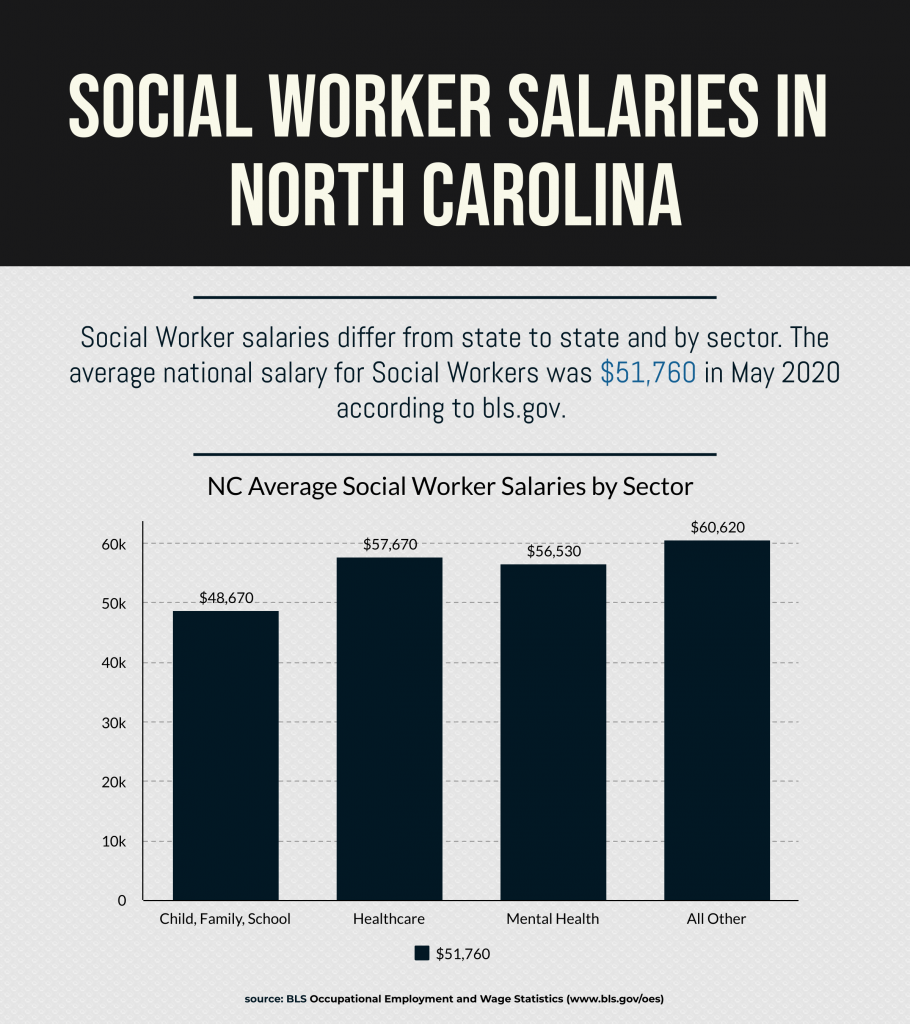
Our Guide on How to Become a Social Worker in North Carolina explains the education, license, and employment information for a career in the state. Are you wondering about becoming a social worker in North Carolina, the Tarheel State?
So what degree do you need to become a social worker in NC? Most social work certifications and all social work licenses in North Carolina require a Master of Social Work (MSW) degree or higher. However, only a Bachelor of Social Work is needed to become a Certified Social Worker (CSW) or a Certified Social Worker Manager (CSWM).
What are the Social Work Schooling Requirements in North Carolina?
There are two broad types of social work. Direct practice Social Work requires a license in some states and an undergraduate degree. These professionals help clients through challenges by assessing needs and finding resources. However, all states require a license to practice Clinical Social Work and typically a master’s degree. Clinical social work involves treating mental and behavioral health or emotional issues. Each state has a slightly different process for how to become a social worker and for how to become a Licensed Clinica Social Worker.
Social Work Degree Levels in North Carolina
All North Carolina social work credentials and licenses have a social worker degree requirement. The state only accepts degrees that have accreditation from the CSWE. However, since the Council on Social Work Education does not accredit doctoral programs, the US Department of Education should accredit your doctoral degree in Social Work in NC.
Bachelor of Social Work (BSW)
A Bachelor of Social Work degree is a specialized four-year program that includes both classroom work and fieldwork. Some states only require a relevant bachelor’s degree to become a certified social worker. Still, North Carolina requires a BSW specifically. Perhaps the essential portion of a BSW degree is the mandated CSWE fieldwork students must fulfill. Fieldwork for BSW students is either a supervised practicum or an internship.
A Social Worker holding a BSW degree is qualified to work in many jobs. For example, typical jobs for Social Workers with a BSW are a caseworker and mental health assistants. These generalist roles utilize the BSW skillset. Additionally, they provide Social Workers with the opportunity to work in various organizations and with clients from diverse backgrounds.
Master of Social Work (MSW)
While a BSW provides graduates with a general background in social work, an MSW focuses on preparing students for advanced practice like clinical social work. Most of the Social Work certifications and the clinical social work license in North Carolina require a Master of Social Work (MSW) degree or higher.
MSW programs accept students who have completed an undergraduate degree in other fields. However, most MSW students start by completing a BSW degree. An MSW is usually a two-year program. However, some accelerated programs allow BSW graduates to earn their MSW degrees in only one year.
As with the BSW program, MSW students must also complete fieldwork before receiving their degrees. The master’s level fieldwork is more challenging than BSW fieldwork, and more hours are required. MSW fieldwork can be structured as an internship or also as a supervised practicum.
Doctoral Degrees in Social Work
A doctoral degree in Social Work is the highest degree offered in the discipline. It demonstrates subject mastery and fulfills the educational requirement for a credential. Doctoral programs in NC have two formats. Thus, Social Workers interested in research will want to pursue a PhD in Social Work. In comparison, the Doctor of Social Work (DSW) has a practice focus.
To qualify for licensure, your degree must come from an accredited program.
What are the North Carolina Voluntary Certifications for Social Workers?
If you practice non-clinical social work, licensure in NC is voluntary. However, to call yourself a social worker in North Carolina, you must be certified. The State of North Carolina offers three voluntary certifications for social workers. Although Social workers are not required to hold these certifications, many organizations look for them when hiring.
The three voluntary credentials for non-clinical social work practice are Certified Social Worker (CSW), Certified Master Social Worker (CMSW), and Certified Social Worker Manager (CSWM).
1. Certified Social Worker (CSW)
The most common social worker qualification in North Carolina is the Certified Social Worker (CSW) certification. To obtain this qualification, social workers must have a BSW and also pass the ASWB Bachelor-level exam. Certified Social Workers in NC are qualified to practice social work at a non-clinical level. The CSW certification is good for two years, though its licensees can renew it indefinitely.
2. Certified Master Social Worker (CMSW)
Certified Master Social Workers in NC are qualified to practice non-clinical social work at an advanced master level. A Certified Master Social Worker must have an MSW degree. They must also pass the ASWB Master-level exam or the Academy of Certified Social Workers (ACSW) exam. This certification is valid for two years, and CMSWs can renew it indefinitely.
3. Certified Social Worker Manager (CSWM)
The Certified Social Worker Manager certification is for social workers in management positions in non-clinical settings. A Certified Social Worker Manager needs to have a minimum of a BSW. They must also pass the ASWB Generalist exam and have extensive field experience. The certification lasts two years, and then CSWMs can renew it indefinitely.
What are the Social Work Licensing Requirements in North Carolina?
The state must license clinical social workers. Therefore, there is one permanent license available, the Licensed Clinical Social Worker (LCSW). In addition, the Licensed Clinical Social Worker Associate (LCSWA) is a temporary license issued to licensees completing the LCSW training.
The North Carolina Social Work Certification and Licensure Board (NCSWCLB) issues social work credentials and licenses. New applicants can obtain a Social Work license in North Carolina by taking the required exam.
1. Licensed Clinical Social Worker (LCSW)
To practice clinical social work in North Carolina, you must have a license. A Licensed Clinical Social Worker can diagnose and treat behavioral and mental disorders. In addition, LCSWs can practice clinical social work independently and supervise LCSWAs.
The Licensed Clinical Social Worker qualification is the only compulsory license for clinical social workers. Therefore, the requirements for this license are very stringent. First, applicants must have an MSW or a doctoral social work degree. They must also pass the Clinical ASWB exam. Additionally, there are social work experience requirements. This license lasts for two years, at which point a licensee must renew it.
2. Licensed Clinical Social Worker Associate (LCSWA)
You must have a license to practice clinical social work in North Carolina. Because of this rule, clinical social workers who are in the process of completing their LCSW work requirements may get a temporary Licensed Clinical Social Worker Associate (LCSWA). Licensees can only hold the LCSWA qualification for up to six years. Additionally, they must work under the supervision of an LCSW.
Steps for How to Become an LCSW in NC
To practice clinical social work in North Carolina you must be a Licensed Clinical Social Worker (LCSW). These professionals often work as mental health social workers. The steps for how to become an LCSW in NC include the LCSWA license process.
- Earn an MSW, DSW, or Ph.D. in Social Work from a CSWE-accredited program.
- Submit a Licensed Clinical Social Worker Associate (LCSWA) application packet to the Board, including three letters of recommendation, official transcripts, and a $145 application fee.
- Complete a minimum of 3,000 hours of post-graduate, paid, supervised employment in clinical social work. At least 100 hours must be supervised by an LCSW who is in good standing with the Board and has been practicing as an LCSW for at least two years.
- Apply for an LCSW license.
- Register for the ASWB Clinical Exam and pay the $260 application fee.
- Pass the ASWB Clinical Exam.
- After the Board approves your application and grants your license you can practice as an LCSW.
Can You Get a Social Work License by Endorsement in North Carolina?
Suppose you have a social work license or certification in another jurisdiction. In that case, you may be able to obtain a North Carolina license by Endorsement or reciprocity. However, this is not guaranteed. For consideration, applicants must be actively licensed or certified in their previous jurisdiction.
Social Work License Compact
The ASWB is working to create a social work licensing compact. The company will allow licensees to quickly obtain a license to practice in a state other than where they hold a license. Stay tuned for more information.
Additional Licensing Renewal and Continuing Education Information
All social work certifications and licenses offered by North Carolina require continuing education (CE) for renewal. Every certification and license has a CE requirement of 40 hours, including four hours of ethics training. The Association of Social Work Boards (ASWB) provides information about their approved CE programs.
How Long Does It Take To Become a Social Worker in North Carolina?
To earn a minimum social work credential in North Carolina takes approximately four years. In contrast, the highest credential can take about eight or more years to achieve.
- 4 years – CSW
- 6 years – CMSW, CSWM, LCSWA
- 8 years – LCSW
How Much Do Social Workers Make In North Carolina?
In May 2022, the US Bureau of Labor Statistics reported the below Social Work career categories in North Carolina average salaries.
- Child, family, and school social workers – $56,680
- Healthcare social workers – $62,760
- Mental health and substance abuse social workers – $60,130
- Social workers, all other – $64,360

Resources For Social Workers in North Carolina
Additionally, information is available on Social Work in North Carolina from the organizations listed below.
- North Carolina Certification and Licensure Board
- School Social Workers’ Association (NCSSWA) in NC
- NC Chapter of the National Association of Social Workers (NASW-NC)
- Society for Clinical Social Work (NCSCSW)
- Association of Social Work Boards (ASWB)
You may find more information from the North Carolina Department of Health and Human Services.
Your Social Work Career In North Carolina
So, if you are interested in a Social Work Career in North Carolina, we have some of the best Social Work schools and programs listed for you.
You may become a school social worker. School social workers serve children and families through the school system.
Or, you may become a substance abuse social worker. Substance abuse social workers help clients get the services they need to overcome their addictions and mental health issues in an appropriate mental health setting.
Professionals may get a master’s degree to become a Certified Social Work Manager. Administrative positions often pay more than clinical practice. Managers may organize group supervision of clients.
Related Social Work:

